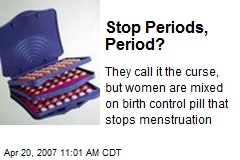
Lybrel
Lybrel is a form of oral contraceptive pill that eliminates menstruation. for the first six months, Lybrel may cause breakthrough bleeding or spotting at different times. After that, however, women taking Lybrel would not have periods for as long as you continue to take it. Lybrel works, providing the same amount of hormones every day, compared to traditional birth control pills, which give the body a rest period of seven days as a placebo (sugar) pills or no pills at all. since there is no disruption of hormones, withdrawal bleeding will not occur.
Depo-Provera
According to the health center for young women, injection of Depo-Provera, or birth control shot, eliminates menstrual periods in many women. the probability of not having a menstrual cycle increases the longer you take the shot. Depo Provera works to suppress ovulation and thinning the lining of the uterus. women on this method of birth control receive a shot every 13 weeks to ensure adequate levels of hormones in birth control at all times. the shot of birth control does not stop once monthly periods, most women have irregular bleeding for the first six months of being on medication.
Continuous birth control cyclic
Although birth control pills in general and the NuvaRing birth control ring are used for three weeks, then stopped for a week to allow menstruation, it is possible, according to feminist women's health center, to adopt, without respite. Thus, the monthly periods as long as you continually use hormones. monophasic birth control pills are taken for 21 days, then re-start immediately, without taking the placebo pills. (This method should not be used with a triphasic birth control pills.) A NuvaRing should be released after 21 days, then replaced the same day. irregular bleeding and spotting may continue for four to six months while using these methods. Consult your doctor for more information on the safety of using these products all the time.
Hysterectomy
Although not typically used only as a method of birth control, hysterectomy, or surgery to remove the uterus, and in some cases, the cervix, ovaries and fallopian tubes, effectively eliminates both periods menstruation and the possibility of becoming pregnant. second womenshealth.gov, hysterectomies are the most often performed to relieve conditions such as fibroids, endometriosis, uterine prolapse, cancer, and persistent pelvic pain.
No comments:
Post a Comment